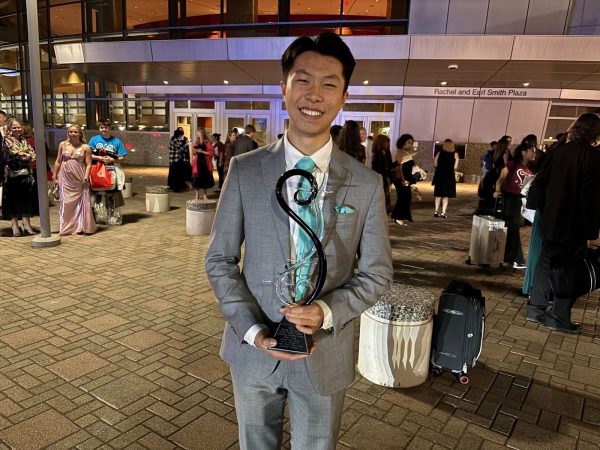Cultural disparity: Living as the “first generation”
Explore the role that food can play in recording divides that result from cultural assimilation.
Recently in Mrs. Harrison’s AP Literature and Composition class, students were tasked with interviewing family members to discover the origins and methods of a traditional family recipe. Students dug into their family history and cultural roots in order to select and create a paper about the perfect dish, and they could even bring in samples of the food into class for extra credit.
I personally opted to explain my family’s wontons, which I learned had originated out of necessity to use as little ingredients as possible in order to produce the most. My mother came from the rural mountains of Anhui, China, and I was already familiar with some of her stories of living in the countryside during China’s Cultural Revolution.
The assignment brought up feelings of conflict I often repress within myself: the difficulties of living as the “first generation” in America and the generational divide between my immigrant parents and my American-born self. Growing up, my diet consisted of Chinese cuisine. However, I oftentimes preferred unhealthier American food as opposed to my traditionally paletted parents. In addition, while I am now the possessor of the family recipe for wontons thanks to my mother, I am also faced with the possibility of being the last to hold this information, as I prefer not to have children in the future.
These types of attitudes were cultivated from growing up in the individualist culture of America as opposed to the collectivist culture of China. There are many more instances of feeling pressured by this divide between my parents and me, but I decided to take my experiences with my heritage and cultural foods and intertwine them into an analysis that people without this kind of background can understand. To do this, I recruited a good friend to provide his experiences as a “first generation” in America.
Jet Wang is a Chinese-American senior at Lambert High School, and his list of achievements include being a model for the DECA prom fashion show, a prominent member of HOSA, an influential member of UNICEF, and the president of Lambert’s Students Against Destructive Decisions chapter. Aside from his numerous extracurriculars and academic achievements, Jet can often be found studying a cookbook in his free time. Cooking is his favorite past time that arose from trying to bond with his sister when she began to learn it.
His mother is an insurance agent who immigrated from Qingdao, China. Her life in China consisted of schooling and some farm chores at home before majoring in chemical textiles. His father originated from Jinan, China and also majored in chemical textiles; both parents met in college. His older sister was born in China before his father received a job opportunity as a professor in America, and his mother soon followed six months later. Eleven years later Jet would be born into Chicago’s suburb of Aurora.
Growing up in a home of working parents and a considerably older sister, Jet is unfortunately not close with his family. No surprise there- he only sees his parents for about two hours a day while his sister, a Vanderbilt and Harvard graduate, is often away from home. Despite this distance, Jet still attributes much of his cooking knowledge as coming from his mother and sister.
When asked about whether he had more knowledge of Chinese or American dishes, he responded that he definitely favored Chinese cuisine to both cook and eat, although Italian cuisine is a close second. “I grew up eating Chinese food so it is very much more nostalgic compared to the burgers and fries that American people eat,” he explained. His accomplishments in culinary also revolve around his heritage, although he has been spending time to expand his skills: “I put a lot of effort into knowing how to manipulate spices in a specific way, and then I’ve also read a book on Persian food, so I might be adept at that stuff.”
For those interested in some culinary adventures for the mouth and stomach, Jet has specific recommendations of his own that range in their cultural origins. His favorite recipes consist of Chef John’s Pad Krapow Gai, a Thai dish consisting of basil chicken; Woks of Life’s Beef Chow Fun, a Cantonese dish of stir fry beef and rice noodles; and El Trompo’s Tacos al Pastor, a Mexican dish with chiles and pineapples. For Chinese food, his favorite dishes may be a bit harder to come across. What stands out in his memory is a giant crab with its own birth certificate indicating its birth in Norway that was presented to his family in a restaurant in Shanghai, the Jade Garden. A more local delicacy is the fried lamb kabob, or “yang rou chuan” in Duluth’s own Wok Rock.
Outside the kitchen, Jet provided a few insights about his personal life to add some spice to the interview. Ironically, for such a person with refined culinary tastes, Jet cannot actually taste any difference between Coke and Pepsi, or their diet counterparts. He does not seem to have any specific goals. According to him, he’s just “taking it day to day” and the plans that he has in mind are to “finish college, get a nice job, not go bald, have a wife, and not have a chronic illness…normal stuff.”
Jet as a person offers the world a view into the life of a teen existing as the first generation of his family in America. It is almost as if he is caught in a divide much like the rifts that many other first generation children experience; how exactly are children growing up in different cultures speaking different first languages and developing vastly different preferences in life as compared to their parents expected to wholly connect with their non-American relatives? For Jet, he feels that he has little cultural ties outside of his cooking. He is able to speak fluent Mandarin, but he still has difficulty reading and writing. When visiting his relatives in China, the atmosphere is awkward and there is a clear separation that isolates him from family members. He is also aware that should he choose to have children in the future, they would not really learn Mandarin; he states that “it would be interesting to see how I grow up compared to how they grow up.” At least he will be able to pass on his knowledge of Chinese cuisine onto his descendants.
And that’s really the sole connection to culture that most first generation children have. When children stop learning the language without having become entirely fluent in it, vocabulary and grammar eventually fade out of their memory when not used in everyday life. Traditions phase out when people move away and start families of their own, often with significant others from different backgrounds. Food really does become the only item that they remember and possibly learn to make in order to keep that factor of nostalgia. To some, this disconnect seems fine as these children will have successfully assimilated into the dominant culture. But for others, it is a tragedy that people are losing touch with a crucial part of their identity. Regardless of how the situation may be viewed, there is no doubt that there is a shifting divide that rises from a cultural disparity between a segment of a culture that immigrated into a dominant culture, and it is one that cannot be remedied by matters of the taste buds.
Your donation will help support The Lambert Post, Lambert High Schools student-run newspaper! Your contribution will allow us to purchase equipment and cover website hosting costs.













